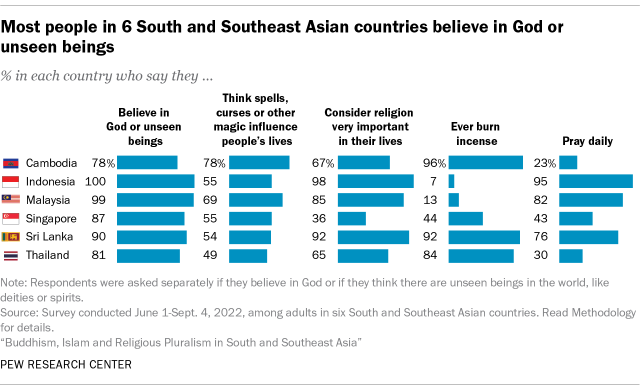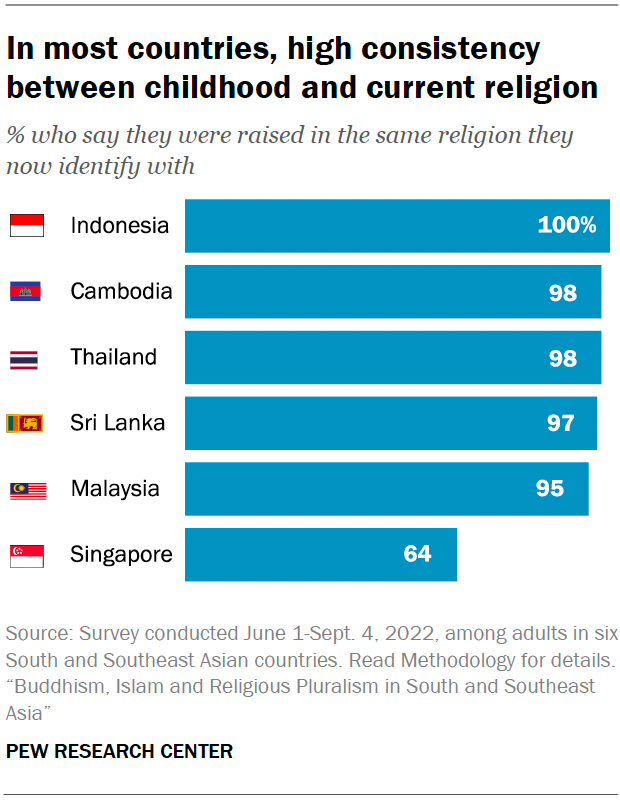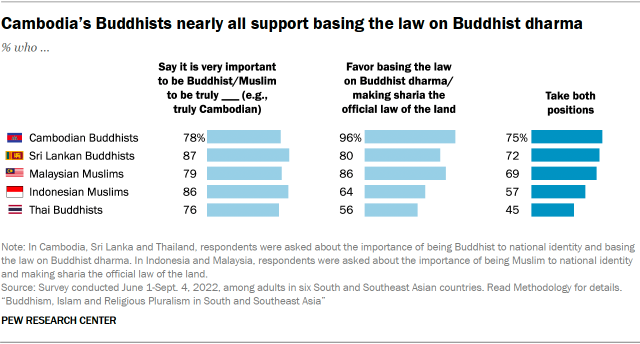Across South and Southeast Asia, countries have very different religious makeups, yet there are commonalities in how they practice and think about religion, according to a new Pew Research Center report.
This analysis is drawn from the Pew Research Center report “Buddhism, Islam and Religious Pluralism in South and Southeast Asia.” For that report, we surveyed 13,122 adults across six countries in Asia using nationally representative methods. Interviews were conducted face-to-face in Cambodia, Indonesia, Sri Lanka and Thailand. They were conducted on mobile phones in Malaysia and Singapore. Local interviewers administered the survey in eight languages from June to September 2022.
This survey includes three countries in which Buddhists make up a majority of the population (Cambodia, Sri Lanka and Thailand); two countries with Muslim majorities (Malaysia and Indonesia); and one country that is religiously diverse, with no single group forming a majority (Singapore).
Respondents were selected using a probability-based sample design. In Thailand, this included additional interviews in the country’s Southern region, which has larger shares who are Muslim. Data was weighted to account for different probabilities of selection among respondents and to align with demographic benchmarks for each country’s adult population.
For more information, refer to the report’s methodology section or the full survey questionnaire.
We surveyed three Buddhist-majority countries (Cambodia, Sri Lanka and Thailand) and two Muslim-majority countries (Malaysia and Indonesia), as well as the religiously diverse country of Singapore. We find that people in these six countries tend to be highly religious and often link their religious and national identities.
Here are five key findings from the report, which is based on more than 13,000 survey responses collected in summer 2022.
The countries surveyed are highly religious by a variety of measures. For instance, most people in all six countries – including near-unanimous shares in Indonesia and Malaysia – say they believe in God or unseen beings. And half or more in each country think that spells, curses or other magic can influence people’s lives.
Majorities in five of the six countries surveyed say religion is very important in their lives, including nine-in-ten or more in Indonesia and Sri Lanka. However, just 36% of Singaporean adults say this.

Rates of specific religious practices are often related to the religious makeup of each country. For example, Buddhists across southern Asia are more likely than Hindus, Christians or Muslims to burn incense, and overwhelming majorities in the Buddhist-majority countries of Cambodia, Sri Lanka and Thailand say they do this.
By contrast, Muslims in the region are more likely than Hindus, Christians or Buddhists to say they pray at least once a day. Daily prayer is most common in Indonesia and Malaysia, the two Muslim-majority countries in the survey.
In five of the six countries surveyed, nearly all adults still identify with the religion in which they were raised. Only in Singapore do a sizable share of adults (35%) indicate their religion has changed during their lifetime.

In fact, many people across the region say it is unacceptable for people to give up their religion or convert to another faith. In Indonesia, for instance, 92% of Muslims say it is unacceptable for a person to leave Islam, and 83% of Christians say it is unacceptable to leave Christianity for another religion.
For most people in the region, these religious identities are not just about religion. Indeed, most adults who claim a religion say that their tradition (e.g., Buddhism or Islam) is not just a religion one chooses to follow, but also a family tradition one must follow, an ethnicity one is born into, or a culture one is part of. Many say their religious identity encompasses all four of these elements.
People in all six countries are generally tolerant of other religions. For example, across all major religious groups, most people say they would be willing to accept members of different religious communities as neighbors. And majorities in most countries agree that other religions are compatible with their country’s culture and values.
However, on some questions, substantial shares of adults are less open to other religions. For instance, 45% of Sri Lankan Buddhists say Islam is incompatible with Sri Lankan values, while 38% of Indonesian Muslims say Buddhism is incompatible with Indonesian culture.
Many members of the majority religion in these countries strongly link their religious and national identities. For example, nearly eight-in-ten Malaysian Muslims say it is very important to be Muslim to be truly Malaysian. Similar proportions of Cambodian and Thai Buddhists say being Buddhist is very important to sharing their national identity.
Many people in each religious majority also say they want their society’s laws to be based on their religion’s teachings. Some 96% of Cambodian Buddhists favor basing the law on Buddhist dharma, and 86% of Malaysian Muslims support making sharia the official law of the land.

People who take both these views stand out from other members of their religion. They generally are more religious, less likely to want neighbors from minority religions, and more likely to support religious leaders’ involvement in politics.
Muslims across the countries surveyed are more likely than Buddhists to support the idea of religious leaders being involved in politics. Fewer than half of Buddhists in all countries surveyed, including 33% of Malaysian Buddhists, think religious leaders should be politicians. By contrast, Muslims are more supportive of religious leaders being politicians, with 58% of Malaysian Muslims saying this.
Likewise, Muslims are more likely than Buddhists in the region to say religious leaders should talk publicly about what politicians they support or should participate in political protests. For instance, 43% of Sri Lankan Muslims think religious leaders should participate in political protests, compared with 22% of Sri Lankan Buddhists.
Nevertheless, more than half of respondents across all the region’s major religious groups – except for religiously unaffiliated Singaporeans (48%) – say religious leaders should vote.
Note: For more information, refer to the report’s methodology section or the full survey questionnaire.
